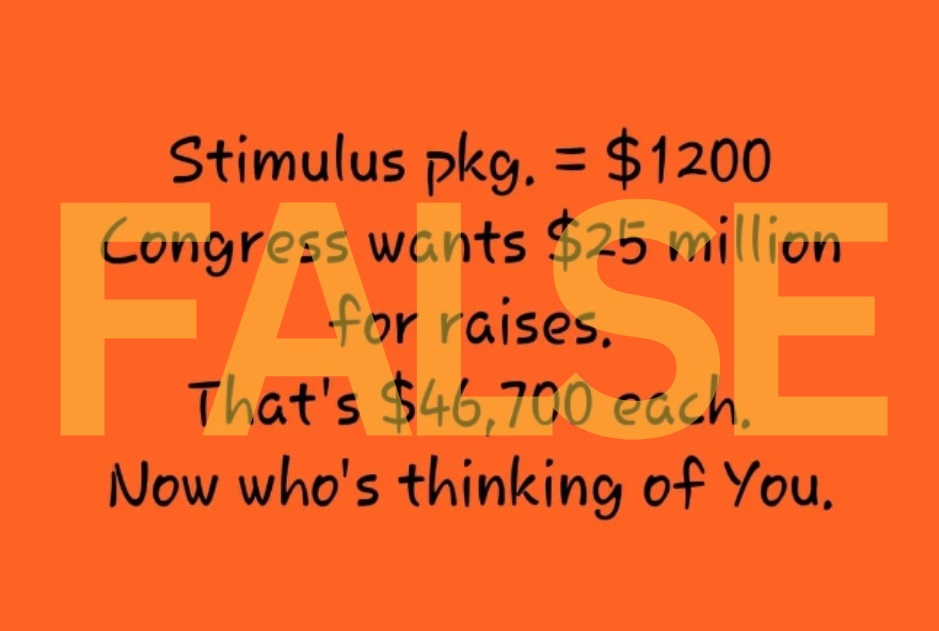

The Coronavirus Aid, Relief, and Economic Security (CARES) Act included a $25 million raise for members of the U.S. House of Representatives.

About this rating
Snopes is still fighting an “infodemic” of rumors and misinformation surrounding the COVID-19 pandemic, and you can help. Find out what we've learned and how to inoculate yourself against COVID-19 misinformation. Read the latest fact checks about the vaccines. Submit any questionable rumors and “advice” you encounter. Become a Founding Member to help us hire more fact-checkers. And, please, follow the CDC or WHO for guidance on protecting your community from the disease.
On March 27, 2020, U.S. President Donald Trump signed the Coronavirus Aid, Relief, and Economic Security Act (CARES), a $2.2 trillion economic relief package to assist Americans affected by the COVID-19 coronavirus pandemic. The bill's most publicized feature was that the federal government would be sending $1,200 checks to every adult with an adjusted annual gross income of less than $75,000.
While negotiations over CARES were underway, social media posts contended that members of Congress — or, more specifically, "[House Speaker Nancy] Pelosi and the Democrats" — were attempting to sneak a $25 million pay raise for themselves into the bill:

However, neither the bill as passed, nor any previous version of it, included a $25 million pay raise for members of Congress. That misperception appeared to arise from a portion of the bill labeled "HOUSE OF REPRESENTATIVES" which set aside $25 million for "Salaries and Expenses":
HOUSE OF REPRESENTATIVES
Salaries And Expenses
For an additional amount for “Salaries and Expenses”, $25,000,000, to remain available until September 30, 2021, except that $5,000,000 shall remain available until expended, to prevent, prepare for, and respond to coronavirus, domestically or internationally, to be allocated in accordance with a spend plan submitted to the Committee on Appropriations of the House of Representatives by the Chief Administrative Officer and approved by such Committee: Provided, That such amount is designated by the Congress as being for an emergency requirement pursuant to section 251(b)(2)(A)(i) of the Balanced Budget and Emergency Deficit Control Act of 1985.
As Evan Hollander, a communications director for the House Appropriations Committee, explained, these funds were not allocated to provide pay increases to House members: “The $25 million funding is to support the House’s capability to telework, including for the purchase of equipment and improvements to the network,” he said. The allocation also provides money to cover the cost of paying the staff of the House Child Care Center, food service contracts, paying the House sergeant-at-arms. “None of the funds will go to member salaries, which are paid directly from the Treasury pursuant to the Constitution,” Hollander verified.
The 27th Amendment to the U.S. Constitution prohibits any law from raising (or lowering) the salaries of members of Congress until after the next national election has taken place, so the House could only raise the pay of representatives elected in the November 2020 election or later (which, naturally, could include current House members who successfully sought reelection).
116th Congress. "H.R.748 - CARES Act" Accessed 31 March 2020.
Seitz, Amanda. "Federal Rescue Package Doesn’t Give Çongress Pay Raises." The Associated Press. 26 March 2020.